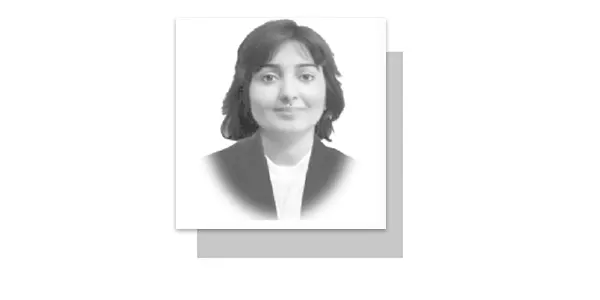NARGES Mohammadi’s thirty years of activism for women’s equality and against gender-based oppression brought her a personal cost of thirty-one years sentence in Iran’s Evin Prison along with one hundred and fifty-four lashes; however, while getting recognized for her efforts toward peace, Norwegian Nobel Committee announced to award her with Nobel Peace Prize. This prestigious award is a clear indication of admitting the laudable efforts of undisputed and undeterred Mohammadi, who was pushed to the verge by a patriarchal and religious fundamentalist society in Iran.
Noticing the facts, it is perceived that, in order to silence women activists, patriarchal and religious extremist societies overlook their works and charge them with spreading anti-religion or anti-state propaganda. Narges Mohammadi was also charged with anti-state propaganda due to Iran’s pervasive theocratic politics; nevertheless, she remained outspoken against the Iranian government inside the prison and protested for justice for Mahsa Amini who died in Morality Police custody in Iran in September 2022. It is not the first time of her being arrested but, previously, she has been detained thirteen times for refuting women’s subjugation and claiming peace and equality. Mohammadi’s vims against gender injustices are not futile since the significant chant ‘Woman, Life, Freedom’ is echoing globally.
Castigating or threatening the women activists who serve as the voice of the voiceless is nothing new. For standing against women’s oppression, gender discrimination, gender-based violence, and women’s sexual harassment, Narges Mohammadi in Iran; for leading the anti-hijab protest, Tamana Paryani and Parawana Ibrahim Khel in Kabul, along with dozens of activists for girls’ education, and some leading figures of ‘Afghan Women Movement for Equality’, such as Zarifa Yaqoobi and Farhat Popalzai in Afghanistan; and the voice of the poorest and the most exploited community, Sudha Bhardwaj in India are some instances of the current surge of activists’ detention in these fragile regions. Similarly, after coming into conflict with the traditional values against girls’ education, Malala was attacked in Pakistan, and then she remained in exile due to violent patriarchal behavior and relentless death threats. Human Rights activist and Commonwealth Youth Award for Asia winner, Gulalai Ismail from Pakistan is another case in exile showing how progressive women are condemned and disregarded by patriarchy. The situation for women gets worsened when while tainting the criminal justice process, justice is delayed in the wake of domestic violence and murders; the two murder cases – Noor Mukadam and Sarah Inam in the capital of Pakistan are the current examples of delaying justice. This brings a need to address institutional deficiencies, technical irregularities, and procedural flaws that hinder the dispense of justice and uphold the rule of law in the country.
Global patriarchal societies with misogynistic tendencies working against women’s advancement in miscellaneous fields operate on shared aims. Taliban in Afghanistan has sought to relegate women by banning their education and erasing them from public life. This uncanny situation has led women to medical troubles, such as depression, anxiety, and attempts to commit suicide. Similarly, the Indian patriarchal society also shows apathy toward violence against women, as a girl was stabbed to death recently in the capital of India.
There seems a nexus of patriarchal mindsets from diverse, ‘powerful and holy’ factions of society which are not limited to Mullahs and Taliban, but also to other hypocritical mindsets camouflaged in the shape of journalists, political leaders, and screenwriters. Such disrespectful and rude mindsets are no exception in Pakistan; among many others, Khalil ur Rehman Qamar is an acute symbol who out lashes against women by reducing their activities to obscenity under the cover of religion and culture. I could not help expressing his right to free speech, but I wonder how the media provides a platform for such spoilers in the prime time of current affairs, and I also question societal people for elating and resonating with the views of such noxious people.
Observing the Global South, whether it is Hindutva’s extremism, the Taliban’s shooting, Lal Masjid’s gang attacks with Bamboo rods, or abusive attacks on women by a religious cum political party (also famous for outbursting minorities’ places of worship), women activists are fronting these fascists ideologies with valor. These mindsets do not consider women to possess strength, yet the iron efforts of women’s discursive activism, women’s movements, and the annual March continue to affirm the equal human personhood in social structures and overcome the dysfunctional status in religious, political, and economic arenas. This anticipates optimism and direction amid threats and punishments, missings and exiles, and detentions and assaults of women activists. There is a germane need to think and be together by rupturing the unremitting difference of borders and forming transnational alliances to confront oppressive regimes and patriarchy in order to get women’s human rights. Women’s inclusion in shaping ideologies that stress their human rights and impartiality in opportunities is also mandatory. The relationship between women, their activism, the media, and civil society is pertinent to situate reforms in patriarchal societies in contemporary times. In the end, I anticipate ‘Woman, Life, Freedom’ as not merely a chant but a pragmatic strength for women.
—The writer is a feminist researcher, activist, and academic. She teaches English Literature at Government College University Faisalabad.










